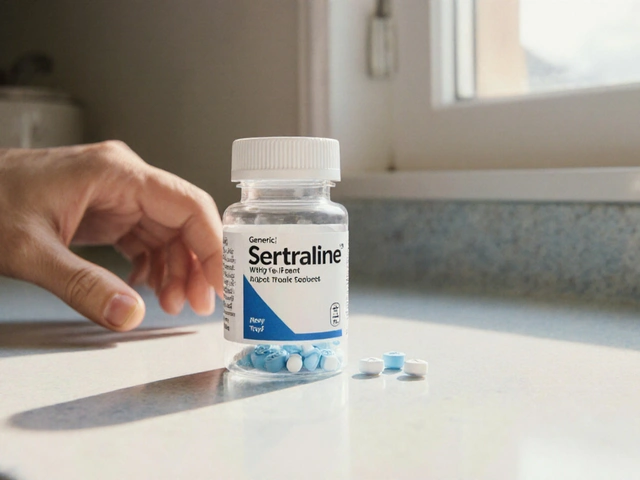No one likes hitting a wall. Especially if it’s the kind that comes after months of trying to shed pounds and not seeing the scale budge. Semaglutide is the hot shot in weight loss meds these days—thanks to those viral before-and-after pics and celebrity buzz. But what if it’s not for you? Side effects, cost, shots—you name it, there are reasons people look for other solutions.
The good news: Semaglutide isn’t the only game in town. Whether you’re worried about side effects, insurance snags, or just the hassle of weekly injections, there are legit alternatives out there. And nope, you don’t need a medical degree to understand what they are. I’ve gone through them all the way I’d explain them to my own kid (well, maybe not Elara yet—she’s too young for pharmacology talk—but you get the point).
Here’s the real scoop on what else is out there, what actually makes these options different, and what you have to watch for. No sugarcoating—just the tools you need to have a real conversation with your doctor or figure out what makes sense for your life. Let’s get into the list and break down what each alternative can do, the good parts, and the less-glamorous side.
- Orlistat
- Liraglutide
- Tirzepatide
- Phentermine-Topiramate
- Bupropion-Naltrexone
- Metformin
- Setmelanotide
- Lifestyle Interventions
- Bariatric Surgery
- Summary Table and Final Thoughts
Orlistat
Orlistat is often the starting point when people look for a Semaglutide alternative that isn’t an injection and doesn’t break the bank. It’s sold over the counter as Alli (60 mg) or with a prescription as Xenical (120 mg). Orlistat works in a totally different way from most trendy weight loss meds: instead of controlling appetite or blood sugar, it keeps about 30% of the fat you eat from being absorbed in your gut. The rest passes right out the other end—sometimes quite literally—and that’s exactly where the main drawbacks show up.
You take orlistat right before a meal that has fat in it. If you skip fat, you can skip the pill. On paper, it sounds pretty simple, and being able to grab Alli at a drugstore is a big plus for folks who hate jumping through prescription hoops. The science on Orlistat is solid: people in clinical studies lost an average of about 5-10 pounds more over a year compared to sticking with diet and exercise alone. Not massive, but not nothing either.
Orlistat isn’t absorbed into your bloodstream, so if you’re cautious about systemic side effects, this one has a checkmark in its favor. For anyone who’s tried injections but hated the gut-wrenching nausea or headaches, Orlistat can feel like a much softer landing. Be honest, though—the main catch is in the bathroom. The infamous "oily spotting" and urgent trips if you go heavy on the fries are a real thing. Some people end up structuring their day around bathroom access, which can seriously cramp your style.
Pros
- Available over the counter—no prescription hassle for Alli
- Doesn’t get absorbed into your system; mostly acts in the gut
- Usually cheaper than GLP-1 drugs like Semaglutide
- Can be started and stopped anytime (just watch vitamin levels if you use it long-term)
Cons
- Bathroom side effects: greasy stools, sudden urges, and sometimes, accidents (especially if you eat a high-fat meal)
- Not as effective for weight loss as injectables like Semaglutide
- May block absorption of fat-soluble vitamins, so you might need a supplement
If you like data, here’s how the common side effects stack up based on real-world use:
| Side Effect | How Common? |
|---|---|
| Oily Stools | ~30% |
| Urgent Bowel Movements | ~20% |
| Abdominal Cramping | ~7% |
Bottom line—Orlistat works best if you have a game plan for eating lower-fat foods and you want something simpler and cheaper than a shot. Don’t expect miracles, but it definitely has a place in the weight loss toolkit if you can live with the bathroom drama.
Liraglutide
If Semaglutide alternatives are on your radar, there’s a good chance you’ve heard about Liraglutide. You probably know it from the brand name Saxenda when it’s used for weight loss. While both Semaglutide and Liraglutide are GLP-1 receptor agonists, they act a little differently in the body and have a few unique perks and drawbacks. The most obvious difference? Liraglutide has to be injected daily, while Semaglutide is weekly.
Liraglutide is FDA-approved for weight management in adults who have a BMI of at least 30 (or 27+ with conditions like type 2 diabetes or high blood pressure). It works by making you feel full sooner, helping with blood sugar, and maybe even dialing down cravings. In big studies, folks lost around 5%-10% of their body weight over a few months using Liraglutide. That’s not a magic bullet, but it’s more than most diet programs alone pull off.
Here’s a quick look at the real-world numbers from clinical trials:
| Average Weight Loss | Duration | Study Participants |
|---|---|---|
| 6-8% | ~1 year | Adults (BMI ≥30 or ≥27 with comorbidities) |
Daily injections can be a hassle, but the pen is pretty straightforward once you get the hang of it. Another thing to keep in mind: Liraglutide isn’t cheap, and getting insurance to cough up the cash can take some wrangling.
Pros
- Solid track record for weight loss—many users lose 5-10% body weight over time
- Helps with blood sugar control, especially for people with type 2 diabetes
- Once-daily auto-injector pens are convenient for some
- Less risk of low blood sugar compared to other diabetes meds
Cons
- Requires a shot daily—not everyone’s cup of tea
- Common side effects: nausea, vomiting, upset stomach (usually fade after a few weeks)
- High out-of-pocket cost unless insurance covers it
- Rare but serious risks include pancreatitis and gallbladder issues
If you’re looking for Semaglutide alternatives that are tried and true, Liraglutide is near the top of the list. It has more research behind it than most competitors and gets real results for a lot of folks. Just double-check what your insurance says before jumping in, and remember: shots every day are part of the deal.
Tirzepatide
If you haven’t heard the hype around Tirzepatide yet, here’s a quick catch-up. It’s a newer weight loss medication that actually pulls double-duty—almost like Semaglutide’s supercharged cousin. It works by mimicking not one, but two hormones (GLP-1 and GIP) that help regulate appetite and blood sugar. This double action is why Tirzepatide has caught a lot of attention with doctors and people looking to lose real weight.
The Semaglutide alternatives crowd loves talking about how Tirzepatide showed up big time in clinical studies. The SURMOUNT-1 trial is the big one: People with obesity lost between 16 and 21% of their body weight in just about 72 weeks. That’s a bigger drop on average than what you see with Semaglutide, and the results have been turning a lot of heads in the medical world.
| Dosage | Average Weight Loss (72 weeks) |
|---|---|
| 5 mg | ~15% |
| 10 mg | ~19% |
| 15 mg | ~21% |
Tirzepatide is an injection, just like Semaglutide. Usually, it’s given once a week. Some folks find it easier than daily meds, but if you’re squeamish about needles, it’ll feel a lot like Semaglutide there. The price point is also pretty steep, especially if you don’t have insurance that covers it yet.
Pros
- Higher average weight loss compared to many other Semaglutide alternatives
- Tackles both blood sugar and hunger; helpful for people with type 2 diabetes
- Once-weekly injection is less hassle than daily meds
Cons
- Similar possible side effects as Semaglutide—think nausea, vomiting, and occasional GI issues
- Cost is high; insurance coverage can be spotty
- Still an injection (not a pill, not oral)
- Long-term safety data is still being gathered
Bottom line: If you’re after serious weight loss and haven’t had luck with other meds, Tirzepatide is a front-runner in the weight loss medications world right now. Just know it’s not a quick fix, and your wallet (or insurance plan) needs to be up for it.
Phentermine-Topiramate
Phentermine-Topiramate is a combo pill that shows up in just about every real-world discussion about Semaglutide alternatives. “Combo” means you’re getting two drugs in one: phentermine, which works like a stimulant to curb your appetite, and topiramate, which was first made for seizures but also helps people eat less.
If you hate the idea of shots, this one stands out—it’s just a pill you take daily. It’s FDA-approved for weight loss and is usually written as the brand name Qsymia. The way it works is simple: you eat less because your brain isn’t bugging you to eat all the time. Over the course of a year, you can expect about a 7-9% drop in your body weight if you stick with the program. That’s similar to, but a little shy of, what Semaglutide can do. Doctors often prescribe it alongside diet and exercise, not as a replacement.
Not everyone will love the way phentermine makes them feel. Some people get jittery, have trouble sleeping, or notice a dry mouth. Others deal with tingling feelings in their fingers or mood changes because of the topiramate. It’s not recommended for people with certain heart problems, glaucoma, or during pregnancy.
Pros
- Convenient daily pill (no needles)
- FDA-approved for weight loss
- Can offer 7-9% weight loss over a year, when combined with healthy habits
- Works by lowering appetite and increasing a sense of fullness
Cons
- Possible side effects: insomnia, anxiety, tingling hands/feet, dry mouth, mood changes
- Not safe in pregnancy—risk of birth defects
- May raise heart rate and blood pressure (mostly from phentermine)
- Need for regular doctor check-ins to track blood pressure and mental health
If you want numbers, here’s a look at how it stacks up against Semaglutide in terms of average weight loss after 1 year:
| Medication | Average Weight Loss (%) |
|---|---|
| Semaglutide | 10-15% |
| Phentermine-Topiramate | 7-9% |
Lots of people use Phentermine-Topiramate as a next step if insurance won’t cover Semaglutide or shots aren’t your thing. Just keep your doctor in the loop—especially if you have any other health issues or take medications for your heart or mood. Safety comes first.
Bupropion-Naltrexone
Bupropion-naltrexone is a combo med that often flies under the radar when folks talk about Semaglutide alternatives. It’s sold as Contrave, and it’s got FDA approval specifically for chronic weight management in adults—so this isn’t some off-label experiment.
Here’s the scoop: bupropion is an antidepressant and naltrexone is used for alcohol and opioid cravings. Mix them together and, weirdly enough, you get a medicine that works on the brain’s appetite center and reward system. In other words, it takes the edge off both hunger and those food cravings that mess up your plans at the worst times (you know, like 9PM snacking in front of the TV).
It comes in a pill, so you don’t have to deal with needles or weekly appointments. Most people start slow, ramping up the dose over several weeks to avoid side effects. Clinical studies show people using bupropion-naltrexone along with healthy habits can lose an average of 5-9% of their body weight over a year. That’s not as dramatic as Semaglutide, but it’s still real progress—especially for anyone who’s seen the scale stuck for years.
Pros
- Oral tablet—skip the injections entirely.
- Helps reduce cravings, not just hunger.
- FDA-approved for weight management—so no off-label guesswork.
- Can be a good fit if you also battle depression (since bupropion is an antidepressant).
Cons
- Side effects like nausea, constipation, headache, and sometimes higher blood pressure.
- Not for folks with a history of seizures, eating disorders, or uncontrolled hypertension.
- Weight loss isn’t as strong as some GLP-1 options.
- Can mess with other meds—so you really need a doctor involved.
Here’s a quick look at how bupropion-naltrexone compares with Semaglutide for weight loss (based on real-world clinical data):
| Medication | Average 1-Year Weight Loss | Form |
|---|---|---|
| Bupropion-Naltrexone | 5-9% | Oral; daily |
| Semaglutide | 15% | Injection; weekly |
If needles turn you off or you want a medicine that targets those "eat just because" cravings, this could be your alternative. But, as always, talk things through with your doctor, especially if your medical history is a bit complicated.

Metformin
Here’s one you’ve probably heard of, especially if you know anyone with type 2 diabetes. Metformin is usually thought of as a blood sugar drug, but it sometimes gets used for weight loss too—especially if you have insulin resistance or prediabetes.
The cool thing about metformin is how it works: it makes your body more sensitive to insulin, helps your muscles use up more sugar from your blood, and tells your liver to chill out on making new glucose. What does this mean for weight loss? Well, most folks who lose weight on metformin don’t drop huge numbers, but it can help slow down gains and maybe chip away a few pounds if you’re dealing with high blood sugar. It’s usually taken in pill form, and you might need it once or twice a day.
If you like hard stats, a bunch of real-world studies have shown that people using metformin for weight loss (especially those with prediabetes or PCOS) might see a decrease of 2–4% of their body weight over several months. Here’s a quick comparison of how it stacks up to other options:
| Medication | Avg. Weight Loss | Common Side Effects |
|---|---|---|
| Metformin | 2–4% body weight | Stomach upset, loose stool |
| Semaglutide | 10–15% body weight | Nausea, vomiting |
The best news? It’s cheap, generic, and most insurance will cover it if there's any hint of prediabetes, PCOS, or full-on diabetes.
Pros
- Comes as an inexpensive pill—no needles
- Good for folks with insulin resistance or PCOS
- Well-studied with a long safety track record
- Can improve blood sugar and lower risk for diabetes
Cons
- Not a dramatic weight loss option (usually just a few pounds)
- Can cause upset stomach or diarrhea at first
- Not approved officially by the FDA for weight loss (it’s an "off-label" use)
- Works best in people with specific blood sugar issues, not the general public
If you’re after something gentle and you have blood sugar problems, metformin is one of those Semaglutide alternatives worth chatting about with your doctor. It’s not flashy, but it’s solid and has been helping people for decades.
Setmelanotide
If you’ve never heard of Setmelanotide, you’re not alone. This weight loss med is a bit of a niche player—it doesn’t make headlines like Semaglutide, but it’s got a really interesting backstory. Setmelanotide works in a totally different way: It targets the melanocortin-4 receptor, which is involved in regulating hunger signals in your brain. So, it’s basically all about helping your body recognize when you’re actually full.
Here’s the kicker though: Setmelanotide is FDA-approved, but only for people with certain rare genetic conditions that mess with weight regulation, like POMC, PCSK1, or LEPR deficiency. In plain English, if your body’s hunger cues are broken because of a gene issue, this med might finally flip that switch. Don’t expect doctors to hand it out for regular weight loss cases—it’s really only for those rare situations.
When it does work, Setmelanotide can have pretty dramatic effects given the right condition. For example, studies show that some people lose up to 10-20% of their body weight in a year. That’s a huge deal for folks who’ve struggled with weight loss from childhood and never seen results from diet or exercise alone.
Pros
- Targets hunger at the brain level, not just insulin/glucose (like Semaglutide alternatives).
- FDA-approved for rare genetic obesity disorders—finally, some hope for those families.
- Significant, sustainable weight loss for people who basically had no options before.
Cons
- Not for general obesity—only approved for specific genetic conditions (so, super rare).
- Insurance coverage can be tricky, even if you qualify.
- Possible side effects include injection-site reactions and, rarely, skin darkening or depression.
One thing I wish more people chatted about: It’s an injection, just like Semaglutide. No pills, and you’ll need a prescription specialist who really knows their stuff. The research is promising if your DNA is a match, but most folks with regular weight issues will need to look elsewhere.
Lifestyle Interventions
Some folks expect magic from pills or injections like Semaglutide alternatives, but the classics—changing up what you eat and how you move—are still king. Lifestyle interventions sound basic, but they actually do a lot if you stick with them. We’re talking about changes in diet, exercise, sleep, and even dealing with stress.
What works best is picking specific habits that fit your real life, not just whatever’s trending this week. For most people wanting to lose weight and keep it off, it boils down to creating a calorie deficit, getting more movement, and building a routine that sticks.
- Balanced eating: Aim for more protein and fiber to keep you full. People often do better swapping sugary drinks for water and cutting back on fried stuff. Tracking meals—even for a week—can open your eyes to calories you didn’t realize were piling on.
- Consistent movement: The target is at least 150 minutes a week of moderate activity, like fast walking or cycling. A wearable tracker can keep you honest with your step count. Even old-school chores (heavy vacuuming, yard work) count way more than you’d think.
- Better sleep: Less than 7 hours a night? Your body likes to grab onto fat and your hunger hormones go wild. Fixing sleep schedules can make a bigger dent in your cravings than most people expect.
- Stress management: Stress eating destroys progress FAST. Try stress-busters like short walks, deep breathing, or even just putting your phone away after dinner.
A cool fact: a 2022 meta-analysis showed that people who paired diet and exercise lost, on average, 7-10% of their body weight over a year—on par with some weight loss meds. Results aren’t instant, but they last if you keep at it.
| Lifestyle Change | Typical Benefit |
|---|---|
| Balanced, reduced-calorie diet | Boosts fat loss, preserves muscle |
| Regular exercise | Cuts risk of diabetes and heart disease, plus more calories burned |
| Healthy sleep habits | Less hunger, better metabolism |
| Stress control | Reduces binge eating, improves willpower |
If you feel stuck, a dietitian or weight loss coach can help you build a game plan. This isn’t as flashy as Semaglutide or pop-up wellness fads, but it’s the foundation every doctor wishes patients would work on first.
Bariatric Surgery
If you’ve been digging into Semaglutide alternatives, bariatric surgery is tough to ignore. This isn’t just another pill or a weekly shot—it's a legit surgical move that can totally change your metabolism and the way your body handles food. You’ve probably heard the big names: gastric sleeve, gastric bypass, and adjustable gastric band. These surgeries shrink your stomach, mess with hunger hormones, and drop your calorie intake way down.
Fact: More than 250,000 bariatric surgeries are done each year in the U.S., and a lot of people lose 30-50% of their extra weight in the first year. That’s a way bigger hit than most meds can manage.
| Procedure Type | Average Hospital Stay | Typical Weight Loss After 1 Year |
|---|---|---|
| Gastric Sleeve | 1-2 days | 50-60% excess weight |
| Gastric Bypass | 2-3 days | 60-70% excess weight |
| Gastric Band | Outpatient/1 day | 40-50% excess weight |
Surgery isn’t some get-thin-quick hack. You’ll need to go through evaluations, hold steady on new eating patterns, and show a real commitment. It’s usually only recommended if your BMI is higher than 40 (or 35 with other health issues like diabetes).
Pros
- Most effective option for serious, long-term weight loss when meds aren't enough
- Often helps reverse type 2 diabetes and lower blood pressure fast
- Reduces risk of serious conditions like heart disease and sleep apnea
- No need for daily medications or injectables
Cons
- Major surgery—comes with risks like infection or bleeding
- Usually permanent and requires lifelong changes to diet and supplements
- Insurance coverage can be complicated
- Some people develop nutrient deficiencies if they slack on vitamins
If every diet and med has failed, or if your health is on the line, bariatric surgery is a powerful but serious tool to consider. It’s not everyone’s first choice, but for the right person, it can mean a whole new lease on life—just make sure you’re ready for the commitment.
Summary Table and Final Thoughts
Choosing between Semaglutide alternatives isn’t a one-size-fits-all move. What works for one person could totally flop for someone else. Maybe you want something over the counter, maybe you hate shots, or maybe your job makes you travel so much you need something you can pop in your bag. Let’s put all the main options on the table and compare what you really get with each.
| Medication/Method | Main Action | Pros | Cons | How It’s Taken |
|---|---|---|---|---|
| Orlistat | Blocks fat absorption | OTC, no shots, cheap | GI side effects, oily stools, less effective | Pill with meals |
| Liraglutide | GLP-1 receptor agonist | Proven effect, daily shot, hunger control | Injection, nausea, more expensive | Daily injection |
| Tirzepatide | Dual GIP/GLP-1 agonist | Best weight loss in trials | Injection, GI side effects, insurance issues | Weekly injection |
| Phentermine-Topiramate | Suppresses appetite | Pill form, effective for some | Heart concerns, mood swings | Daily pill |
| Bupropion-Naltrexone | Acts on brain for hunger | Oral, helps with cravings | May cause nausea, blood pressure risk | Daily pill |
| Metformin | Reduces glucose, curbs appetite | Cheap, very safe when tolerated | GI issues, less weight loss | Daily pill |
| Setmelanotide | Targets rare gene disorders | Works for genetic cases | Tiny user group, pricey | Injection |
| Lifestyle Interventions | Diet, movement, habits | No side effects, affordable | Slow, hard to stick with long term | All day, every day! |
| Bariatric Surgery | Physically reduces stomach/absorption | Most effective for severe obesity | Risks, major recovery, surgery cost | One-time medical procedure |
Notice how nothing here checks every single box. Semaglutide alternatives can be cheaper, more convenient, or have fewer harsh side effects. But sometimes, you trade off effectiveness, ease, or long-term data. Here’s what one obesity medicine specialist had to say about GLP-1s versus older meds:
"Most people lose more weight with GLP-1 medications like semaglutide, but some folks do just as well with older medications or lifestyle changes if they can actually keep up the habits." — Dr. Scott Kahan, National Center for Weight and Wellness
Let’s be real: insurance coverage, side effect fears, and the way a drug fits into your daily mess (yup, even with kids running around like Elara!) matter just as much as what’s written in the study results. Before making a call, write down what matters most for you. Is it cost? Is it convenience? Do side effects freak you out? Bring that to your doctor—don’t just ask “what’s best,” ask “what fits my life?”
There’s no magic answer, but there’s a real path for almost everyone now. If something doesn’t work—don’t quit looking. One switch could put you back in the game.







abhishek agarwal
April 18, 2025 AT 17:49